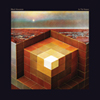Black Mountain, "In the Future"
 Arrayed in dystopian garb and armed with righteous indignation, Black Mountain's newest record explodes and pounds in unison with the bombs and wars that populate Stephen McBean's lyrics.
Arrayed in dystopian garb and armed with righteous indignation, Black Mountain's newest record explodes and pounds in unison with the bombs and wars that populate Stephen McBean's lyrics.
Jagjaguwar
The world is a bleak place in McBean's eyes. It is full of violence, injustice, doubt, and little else. What hope that does exist lays dormant in a shelter under the constant threat of dehumanazing and near-invisible evils; there's plenty of melodrama on In the Future and much of its bombast serves to positively amplify Black Mountain's unusual approach to rock 'n' roll. "Stormy High" begins with a sudden and heavy jerk. It stomps about wearing tattered guitars and half-moaned vocals with confidence, drawing its sex and grit together closely enough to warrant thoughts of "The Lemon Song" and Robert Plant convulsing on stage in a rage of orgasmic delight. McBean's idea of danger, however, revolves less around his penis and more around enslavement and the kind of demons that haunt lazy or uninspired men. Their debt to blues and '70s rock made apparent, the band proceeds to carve the lazy "Angels" out of sweet pop mechanics and epic synthesizer swells. This is the first sign that Black Mountain is about to attempt something a little bizarre, which is the fusing of psychedelic pop, rock, and metal with the stylings of America's "southern rock" music. It is true other bands have done this, but Black Mountain's particular blend of these elements is especially bold. They sacrifice little of the elements that make each of these genres distinct and instead mash them together with tremendous force, pulling equal amounts of heavy guitar mashing and LSD-inspired madness from their instruments and tongues.
"Tyrants" represents the first all-out mashup on the record. When it begins it sounds like a titanic march across a barren desert, a march so large that war drums are an unnecessary addition to the stomping of the army's feet. With a dusty bass line and resigned drum beat, the song quickly shifts into a lower gear. Enormous spaces open up in the music and a seething synthesizer begins to circle through the song like a vulture. The lyrics and music then work themselves back into a frenzy propelled by an infatigable disdain for the evil men do. A deep serenity pervades much of the song in the form of cascading electronic melodies and a rubbery rhythm, but its all sandwiched between heavy guitar riffs and a solo that calls Satan to mind more than Timothy Leary. In contrast, "Wucan" emphasizes psychedelic rock's influence on the band. After a fuzzy and vaguley funky rhythm section sizzles out, the music is shot through with thick, almost cheesy keyboard atmospherics. They shimmer and wobble in acidic light while the band plugs along beneath their vast reach. I had to make sure Richard Wright wasn't listed anywhere in the liner notes after the song ended.
The bombast doesn't always work in the band's favor, however. There are moments where the music is as awkward as some of McBean's introverted and indecipherable lyrics. "Stay Free" clunks along with a beautiful melody and an ethereal vocal performance, but it sounds flat sandwiched between "Wucan" and "Queens Will Play;" the band's more playful elements are absent and the lyrics are, for lack of a better term, confounding. Perhaps someone with more time than I have can make sense of these lines: "Bodies at sundown / Stiff on their knees / Beautiful ponies / So beautiful / They'll kill us all." Even when the band is firing on all cylinders, their tendency to shoot for the epic causes some amount of stumbling. "Evil Ways" could be a great voodoo jam spiced with American brute force, but ends up sounding awkward due to the rather lackluster employment of an organ and a chorus that feels out of place on this album.
"Bright Lights," the album's 16 minute dénouement, brings every song's best and worst qualities together. The lyrics are less than stellar, but the instrumentation blends the bands gentle and aggressive qualities without flaw. The entire middle portion of the song is an extended psyche-jam with all manner of minutae populating the drone that serves as the song's core. The band's physical and creative energies shine through on this song most clearly. "Bright Lights" also highlights just how fragile some of the band's compositions are; in their quest for fusion they sometimes overlook the fact that some of their songs offer little more than that fusion. Their energy helps to carry them through some rough spots, but without it a few of these performances might've ruined the record.
This quintet's energy is their greatest virtue and when it is paired with solid songwriting Black Mountain sound both unique and as massive as their name implies.
samples:



